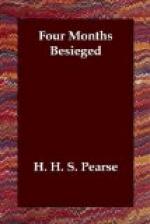Just before nightfall Sir Redvers Buller’s cavalry were reported in sight. The first token of their coming were loud cheers away on the plain towards Intombi neutral camp, where some of Colonel Dartnell’s Frontier Police, with Border Mounted Rifles and Natal Carbineers, had been patrolling since early morning. With joy on their faces, and many with tears in their eyes, the people rushed towards a drift by which the Klip River must be crossed. There General Brocklehurst was waiting, and as a horseman, weather-stained and begrimed by days of bivouacking, floundered from deep water on to the slippery bank, he was received with a hearty hand-grip and welcomed to Ladysmith. Then loud cheers went up for Lord Dundonald, commander of the Second Cavalry Brigade, whose irregular horsemen have made for themselves a great name as scouts. We have often heard from Kaffirs about ubiquitous troopers who were described as wearing sakkabulu feathers in their hats and carrying assegais. We were all anxious to see these men, and I especially had often looked out for them, since some one had told me that they were the South African Light Horse, in which, as I think I have mentioned elsewhere, a son of mine commands a troop. We had heard of them and Thorneycroft’s Mounted Infantry in the thick of the fight at Spion Kop, and in many other affairs, but only one came with Lord Dundonald and the advance guard, in which were Imperial Light Horse, Carbineers, Natal Police of the Frontier Field Force, and Border Mounted Rifles, numbering only one hundred and seventy, under Major Mackenzie. They had pushed forward after the last feeble resistance of the Boer rearguard was overcome, and Lord Dundonald brought to Sir George White the good news that Ladysmith’s relief was accomplished.
The crowd of soldiers and civilians shouted itself hoarse in cheering Sir George White when he came with the object of meeting Lord Dundonald. He could not get through this crowd outside the gaol, where Boer prisoners were standing on the balcony curious to know what all this commotion might mean. When a lull gave him an opportunity of speaking, he said in a voice trembling with emotion, but clear and soldierly for all that:—
“I thank you men, one and all, from the bottom of my heart, for the help and support you have given to me, and I shall always acknowledge it to the end of my life. It grieved me to have to cut your rations, but I promise you that I will not do it again. I thank God we have kept the flag flying.”
Three cheers were given for Sir Redvers Buller and General Sir Archibald Hunter, and then the whole crowd joined in singing “God Save the Queen,” with an effect that was strangely impressive in the circumstances. This morning, after a reconnaissance had been sent out to watch the enemy’s retirement, and if possible intercept convoys, Sir Redvers Buller with his staff rode into town and met Sir George White before any demonstration could be made in his honour, and after remaining at headquarters a short time only, he rode back to camp, or rather bivouac, with the troops who had fought so heroically under him for the honour of England.




